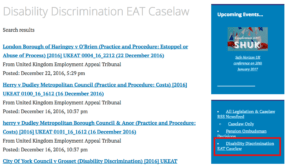Happy new year to all our readers!
Under the Equality Act 2010 (Specific Duties) Regulations 2011, police forces are listed bodies (under schedule 19) and are required to comply with the non-devolved general and specific duties under the Equality Act 2010 (EqA). The Court of Appeal has clarified that protection against victimisation contained in the Equality Act can be extended to former employees.
In preparation of our 2017 series focusing on disability discrimination law, we are proud to publish another live connection to the British and Irish Legal Information Institute website.
The new Disability Discrimination EAT Caselaw menu item can be found on the right sidebar:
You will see each Employment Appeal Tribunal case (and new ones as soon as they are published) defined as relating to the Police (either as the named party in the case or referenced by the Judge as relevant to the law as established by the outcome of a former case).
The above search of bailli.org using the terms ‘disability discrimination‘ AND ‘chief constable’/’commissioner of the Met‘ (as at 1st Jan 2017) returns 422 results for EATs. A cursory straw-poll of the results shows that 31 cases directly relate to a Police force as a named party in the title of the appeal – so 7.3% of these listed disability discrimination EATs directly involve a police force and the rest involve other employers where the judges have use the legal precedents found in the police related EATs or their subsequent Court of Appeal hearing.
This frequency shows a revealing characteristic of how UK police services apparently fail in their obligations to the EqA given the appeal tribunals they defend are regularly quoted in otherwise non-police disability discrimination court proceedings. Evidence of deep institutional failure or are forces the unfair victims of vexatious complaining? If the outcomes follow the same pattern of the judicial reviews, the majority of which are found against the police pension authoities, the former is more probable. We intend to put a meaningful measure to the EAT results.
Is horrendous treatment of those applying, or with an injury award, a proportionate means of achieving a legitimate aim? Is the aim legitimate and are there no less discriminatory ways of achieving it? Can police forces admit to discrimination but hide behind the defence of saying it is objectively justified?
Over the coming months we will try to answer these questions and explain in easy terms how these cases relate to those with, or applying for, injury awards.

